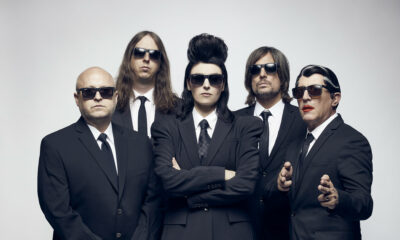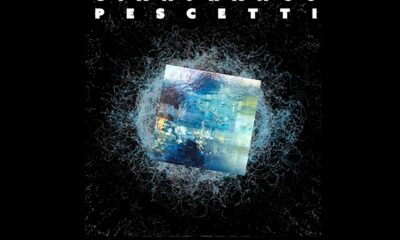Interviews
Interview with Steven Wilson – February 19th, 2016

By Mike Bax
Photo by Hajo Müller
stevenwilsonhq.com
twitter.com/StevenWilsonHQ
www.facebook.com/StevenWilsonHQ
Revered among music fans the world over, Steven Wilson is considered to be one of the finest musical composers and producers in the world. His work with Porcupine Tree, No-Man, Storm Corrosion, Blackfield, Bass Communion, Incredible Expanding Mindfuck, and Opeth is the stuff of musical legend, and his merits as a songwriter/producer will continue to escalate him to über-legendary status as time continues to pass.
Last year, Wilson released an excellent album entitled “Hand. Cannot. Erase.” He has recently released a follow-up album entitled 4 ½ which contains material that didn’t fit into the sequencing on “Hand. Cannot. Erase.” and The Raven That Refused to Sing. On March 1st, Wilson will bring his solo tour to Massey Hall for a lengthy performance of material that will encompass the entirety of “Hand. Cannot. Erase.” along with a slathering of songs from 4 ½ and his respectable back catalog. Wilson promises this performance will be something of a unique experience for fans. Porcupine Tree / Wilson fans should mark the date in their calendars and prepare themselves for an audio visual evening of epic proportions, in one of Canada’s most revered music venues.
Mr. Wilson was good enough to answer a few questions by phone this past Friday in anticipation of this approaching tour. He entertained a few personal questions about his back catalog, his production and remastering work, Marillion, and his admiration for Opeth’s Mikael Åkerfeldt.
Mike: Are you currently on tour right now for 4 ½, or are you just getting ready to come over here to North America and start dates?
Steven: I’m in between. We finished in Europe three days ago and I’ve have ten days off now before we leave for Canada at the end of this month.
Mike: What do you typically do with your downtime? Do you have some hobbies you can go to and relax?
Steven: Well, right now I’m doing interviews to promote the tour (laughs). So you can tell that I’m working today. I do get downtime. People have this idea of me as a workaholic. But part of that is that I love what I do. Often times it doesn’t feel like work at all. I’ve got a couple of weeks off now and I’ve got a lot of home stuff to catch up on. I’ll spend some time with my family and my little doggie, but I’m still working. I’m doing some finishing touches to mixes I’m doing, or I’m doing promotion. Whether it’s paying bills or approving tour merchandise, there is always something that needs to be done. But I’m happy to do it. I’m a self-confessed control freak, so if I don’t do it, I’m not going to be happy.
Mike: It’s my understanding, based on what I’ve read in various interviews, that you didn’t love learning guitar as a child. What ultimately brought you back to the instrument?
Steven: I learned to play guitar among several musical instruments that I taught myself to use because I wanted to make records. I wasn’t interested in being a musician, per se. I wasn’t interested in being a singer, per se. I wasn’t interested in being a front man. I wanted to be a director. I wanted to be the guy who had a musical vision in my head and I wanted to find a way to make that real – to make that flesh, as it were. So the answer to your question is that I went back to the guitar because I had to. I had to find a way to develop the tools that would enable me to do what I really wanted to do – to be a writer / producer. That’s what I fell in love with, the idea of being in control of all of these resources; whether it’s musicians. or musical equipment. or studios, or production techniques – in order to create this cinema for the ears.
Mike: So let me ask you this: do you believe in natural musical ability? And do you believe that you have that?
Steven: I think I have a natural ability, which is not to do with playing instruments. It’s certainly not singing; you know? Singing is something I’ve struggled with. I don’t have the best voice but I’ve overcome this. The thing that I think I have natural ability in is hearing. Let me explain – what I mean by that is, I think I’m good at producing and mixing because I hear the sound in my head. What I’ve learned over the years is that you can’t teach someone to mix or produce or make records if they don’t hear it in their heads in the first place. Does that make sense?
Mike: Yeah, it does.
Steven: You can teach someone how to use a compressor, you can teach someone how to play a guitar, you can teach someone how to use reverb and echo and how to use electronic work stations and play keyboards. But the bottom line is, if they don’t hear it in their head, they will produce junk. I suppose that’s true of guitar players as well, isn’t it? You can teach someone how to play. The internet is full of people that can shred – but couldn’t write a piece of music if their life depended on it. They can play more notes a second than anyone else on the planet, but they can’t make anything that anyone actually wants to listen to. And I think that’s the difference. There is a massive chasm between ability and creativity, which I think most people don’t appreciate.
Mike: Knowing that you have an audience who revere you as a thinking man’s rock guitarist, what advice would you have for novice musicians, keen on a career, who enjoy your solo back catalog and the Porcupine Tree back catalog?
Steven: My advice is, don’t think that learning the technique is what you need. What you need to do is listen to as many different guitar players in as many different genres as you can. Don’t just listen to metal guitarists who can play really fast with the same old tone that every other guitar player has. That’s boring to me. One of the things I miss from guitar players these days is variation in tone and sound, particularly the guys that play fast because they always tend to use the same tone. I am a guitar player from the perspective of being a sound designer rather than a player. I’m more interested in sound and texture. So my advice is to listen to all the different guitar sounds out there, experiment a lot with pedals and sound design. Sometimes if you’ve got the right sound, you only need to play one note and it fulfils exactly what the song requires. Sometimes it’s not about what you do with your fingers, it’s about what you do in terms of processing the sound. The best guitar players for me, people like Robert Fripp and David Gilmour, its as much about their sound and their tone and them knowing what NOT to play as it was about technique and virtuosity.
Mike: I’ve been playing 4 ½ heavily since it came out a few weeks ago. Considering it’s a bridge between “Hand. Cannot. Erase.” and your next recording, I was surprised it didn’t feel more like a B-sides compilation. It’s a lovely album. The songs on it are great. I’m interested in knowing where you were as an artist, sitting on these few songs and trying to figure out how to release them?
Steven: I hope that what you say is true – that 4 ½ is a strong piece of work. I think part of the reason for that is… you used the term B-sides, which I totally understand as I’ve struggled myself to try and find an expression to try and sum up these songs; leftovers; B-sides; outtakes; all kind of suggests that these songs were somehow rejected or not good enough. While it’s true they were rejected from the past few albums, they weren’t rejected because they weren’t good enough. They were rejected simply because conceptually and thematically they didn’t fit. Most of my core albums have this kind of conceptual shape to them. And sometimes there are songs that I just can’t make fit. These songs on 4 ½ are examples of that. I was just as proud of these songs as the ones I selected for the “Hand. Cannot. Erase.” album, but I couldn’t make them fit. So it’s nice to have the opportunity to give them their release. To sequence the songs and make it feel like a very satisfying album listening experience.
Mike: I really like the funky jazz / heavy guitar mixture on ‘Vermillioncore’. It’s an awesome song.
Steven: Yeah. That’s cool. That song almost has a kind of a drum and bass feel to it, doesn’t it?
Mike: And there’s reverb on the heavy bits towards the end of the song – a rattle that almost fills the song out somehow.
Steven: That particular song, all I had originally was the baseline and I couldn’t figure out what to do with it. So it was only when I came to put 4 ½ together that I sat down and finished it off. Musically it’s quite simple. Going back to what we were talking about earlier, it’s all about sound design, which hopefully makes it an interesting journey.
Mike: I was going to describe it as Primus-like. So I’m glad to hear it was originally a baseline. It reminded me of Primus.
Steven: I’ve heard that name, but I don’t know Primus all that well. But yes, that kind of a baseline has an almost ‘dub’ feel to it. Lots of bottom end information that kind of anchors the whole track. And then everything else kind of floats over that bottom end.
Mike: What brought you back to ‘Don’t Hate Me’? And how did you decide on Ninet Tayeb to sing this new version with you?
Steven: ‘Don’t Hate Me’ is a song from my back catalog, which I felt had been overlooked. I’ve started now to pick songs for the live show that are not the most fated or most acclaimed, but have special meaning/resonance to me. ‘Don’t Hate Me’ is one of those songs. It was originally written and recorded by my band Porcupine Tree in the late 1990s and we only played it on one tour and it was never re-visited. I’ve always felt it was one of my best songs. The second part of my answer to your question – why do it with Ninet – is that it was always intended to be a duet between two different characters. If you listen to the song, you can hear that the character singing the verse is very distinct from the character singing the chorus. There’s almost a question and answer vibe going on. The original version wasn’t recorded like that. It was recorded with me singing both sections as different parts. It was nice to finally revisit the song and record it as the way I’d originally imagined it. In some ways it’s the definitive interpretation of the song for me.
Mike: What can fans expect to see at your Toronto show at Massey Hall on March 1st? Are you rotating your set lists night by night?
Steven: There’s a little bit of rotation. The way the show is put together we cannot easily just change it up willy nilly. There’s a lot of film in the show and all of those films have to be synchronized with the music. The first half is a complete performance of “Hand. Cannot. Erase.” from beginning to end, with all of the films as sequenced on the record. Then there is a 20-minute interval and the second half is music from 4 ½ and a smattering of stuff from my back catalog going back to ‘Don’t Hate Me’. There are films and multimedia aspects to this second half, too. We do change it up a little bit but not much. The only time we really change it up is when we do a two-night residency and then I try and do something really different with the second night. I think Toronto will be largely the same show we have been doing through Europe the last couple of months.
Mike: Have you performed at Massey Hall before, Steven?
Steven: I don’t think so. I know it’s a legendary venue, isn’t it?
Mike: It is. I think you’ll be pretty impressed when you get there.
Steven: Yeah. I’ve got a Neil Young album that was recorded at Massey Hall, I know that.
Mike: And the Rush album, All the World’s A Stage, which I think was recorded there as well.
Steven: Oh, was it? Ok then. I didn’t know that. I’m certainly looking forward to it.
Mike: When you approach remixing classic albums by bands like King Crimson and Jethro Tull, albums revered by yourself and music aficionados the world over, what steps do you take to ensure you preserve the integrity but fill it out at the same time?
Steven: The answer to the first part of your question is, you refer VERY closely to the original stereo mix. There’s a lot of detective work involved in that. I’m trying to recreate the stereo mix without necessarily having the same tools and the same technology that they had at the time. And sometimes it’s hard to figure out just how they created certain sounds. Often the artist doesn’t remember, you know? If I go to Ian Anderson from Jethro Tull, or I go to Roland from Tears for Fears and ask: “How did you create this sound in the mix?” They don’t remember. It’s like 30 to 40 years ago for them. So there’s a lot of that detective work involved. That’s the first part of my answer. To be very faithful to the original stereo mix and to be constantly referring back to it. And that comes onto the second part of your question – to paraphrase it, “what am I looking to enhance?” I think the best analogy I can give is this: a few decades ago when they cleaned the Sistine Chapel in Rome, they were taking these incredible Michelangelo frescoes and were cleaning them, but they were not changing anything about the content. They were simply trying to make them shine with new clarity. That’s the best analogy I can give. I’m using modern digital tools to make the music shine a little bit brighter for the modern age. It’s a very fine line to walk, keeping the spirit and the sound of the original but somehow making it shine and gleam a little bit brighter for the 21st century.
Mike: I would love to know if you remember when you first met Mikael Åkerfeldt, and what it is you enjoy most about his musicality, and collaborating with him?
Steven: I do remember when I first met Mikael. It was in Camden Town in London. I’m sure he won’t mind me saying so, but he was unbelievably nervous because he was a fan. Since then I have become a fan of his. We are equals these days. But that first meeting was very strange for me. And for him, I’m sure. I think he came with his wife, his girlfriend at the time, to try and give him some extra courage. What do I find I enjoy? First of all, he’s one of my favourite guitar players in the world currently, not to mention one of my favourite writers. We really bond is on two things – we occupy a similar role in our various musical lives as auteurs and control freaks. When I was in a band before, Porcupine Tree, we had very similar situations. We were the lead singer and lead guitar player, writer and producer. With that comes a lot of responsibility and a lot of resentment. We found solace in each other, being able to share our experiences, you know? The second thing we share is our incredible curiosity about music. There is nothing you can suggest to Mike that he will say, “I’m not interested”. He is fascinated by all of the possibilities about music. He’s not interested in the idea of musical genre, as am I. If I told him there was a strange country and western album, he would be very interested in hearing it. That kind of appetite and curiosity that knows no boundary is a very rare and very special thing. This extends to when we work together in the studio. There is nothing either of us can say to each other that the other will say, “You’ve gone too far”. (laughs) We egg each other on and push each other along to experiment and that is, sadly, an unusual thing I have to say.
Mike: You have worked with both Marillion and Fish. Were they an important band for you growing up?
Steven: Yeah, very much so. I grew up in the eighties; a lot of the music I was finding more interesting from the previous decade. I grew up with bands like XTC, Tears for Fears, The Cure and Joy Division – fantastic eighties bands, but at the same time I was hearing all of this music from the previous decade that was really exciting to me. But none of those artists were really on tour – and if they were, they were well past their peak, or they had morphed into some other kind of band. So when a band like Marillion came along, from a town called Aylesbury which is only about 20 miles from where I grew up; I could see them play in small clubs and pubs. I was like 12 or 13 years old at the time, and they seemed to be preserving the experience of the music that I thought had disappeared. So they became incredibly important to me and to a lot of my friends who felt the same way. We all felt we’d missed out on that whole approach to music, and that whole era. We were really excited to find there was a band doing this. In retrospect, when I go back and listen to Marillion I think there was a lot more going on that was actually much more modern and contemporary. They had an eighties pop sensibility that most of the seventies bands never had. And I think that was something very unique to them. They are very good friends of mine now and continue to be a very important band to me.
Mike: Did you get to tour with either Fish or Marillion?
Steven: Porcupine Tree opened for Marillion. This would have been about 2000 or 2001, we did a tour of Europe opening for Marillion.
Mike: Have you performed with them as a musician on stage?
Steven: I have performed with Fish as a guest, but I’ve never been on stage with the Marillion guys, no.
Mike: Is Porcupine Tree done, Steven? Would you ever go back and revisit that?
Steven: I don’t know. I don’t want to say it’s done because I don’t see the point of saying something is done. How many times have we heard that bands have broken up inevitably to see them get back together? I’d say it’s ninety percent of the time (laughs) that bands get back together. So I just thought to myself “What’s the point of saying it’s done.” People can figure out for themselves. I’m not ruling out that we might get back together to make another record one day. But there’s no way that Porcupine Tree would ever, ever become my primary focus again. Clearly, having established myself as a solo artist now, that would be an incredible backwards step for me. If Porcupine Tree were to make another record it would be more for fun. So I wouldn’t say it’s done, but it’s finished as a primary focus for my creativity. I felt it was time to move on. And sitting here now, I know I made the right decision there.
Mike: I am curious if you ever look back on your albums, and how you feel about the album In Absentia now?
Steven: I haven’t listened to it since 2003. I don’t listen to any of my own records once they are finished. In fact, it’s kind of painful to do so in some respects. That’s not entirely true, though. I do have to listen to them if I’m remastering an album, or if I’m trying to learn a song for the live show. I had to listen to the old version of ‘Don’t Hate Me’ to remember it, you know? Generally speaking, I find it quite painful because all I hear is the stuff I would do differently now. It’s hard sometimes to appreciate what fans appreciate. I know I’m not alone in this because going back to my remix work, I see sometimes the pain on the faces of the people whose work I’m remixing as they have to relive and revisit and re-hear the music they have made in the past, just because they remember certain situations and band politics that were painful to them at the time. Or they just hear production mistakes that they wish they’d fixed. I don’t think I am unique in this. But if you ask me, I’ll sound very proud of In Absentia. In fact, I think it’s probably the best Porcupine Tree record there was, along with Fear of a Blank Planet. Those for me are the twin peaks of the Tree catalog, you know? But that doesn’t mean I want to hear them. It’s more a question of being proud of the material and remembering that the albums worked very well thematically. They cohered very well together and the songwriting was very strong. I don’t know if that answers the questions very well, but I am very proud of the album.
****
-

 Music5 days ago
Music5 days agoTake That (w/ Olly Murs) Kick Off Four-Night Leeds Stint with Hit-Laden Spectacular [Photos]
-

 Alternative/Rock6 days ago
Alternative/Rock6 days agoThe V13 Fix #010 w/ High on Fire, NOFX, My Dying Bride and more
-

 Hardcore/Punk2 weeks ago
Hardcore/Punk2 weeks agoHastings Beat Punks Kid Kapichi Vent Their Frustrations at Leeds Beckett University [Photos]
-

 Alternative/Rock2 weeks ago
Alternative/Rock2 weeks agoA Rejuvenated Dream State are ‘Still Dreaming’ as They Bounce Into Manchester YES [Photos]
-

 Features5 days ago
Features5 days agoTour Diary: Gen & The Degenerates Party Their Way Across America
-

 Culture1 week ago
Culture1 week agoDan Carter & George Miller Chat Foodinati Live, Heavy Metal Charities and Pre-Gig Meals
-

 Music1 week ago
Music1 week agoReclusive Producer Stumbleine Premieres Beat-Driven New Single “Cinderhaze”
-

 Alternative/Rock1 week ago
Alternative/Rock1 week agoThree Lefts and a Right Premiere Their Guitar-Driven Single “Lovulator”
















